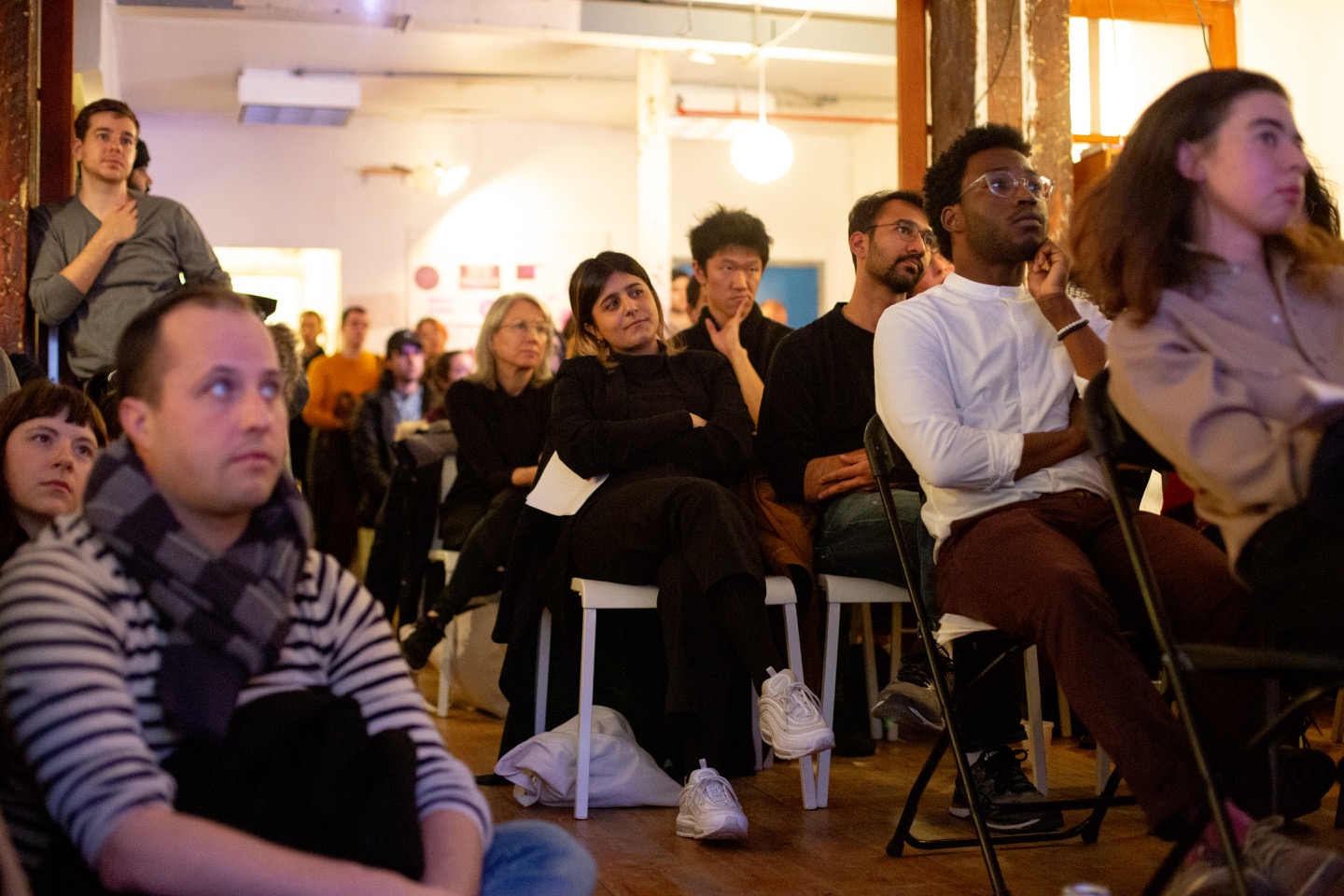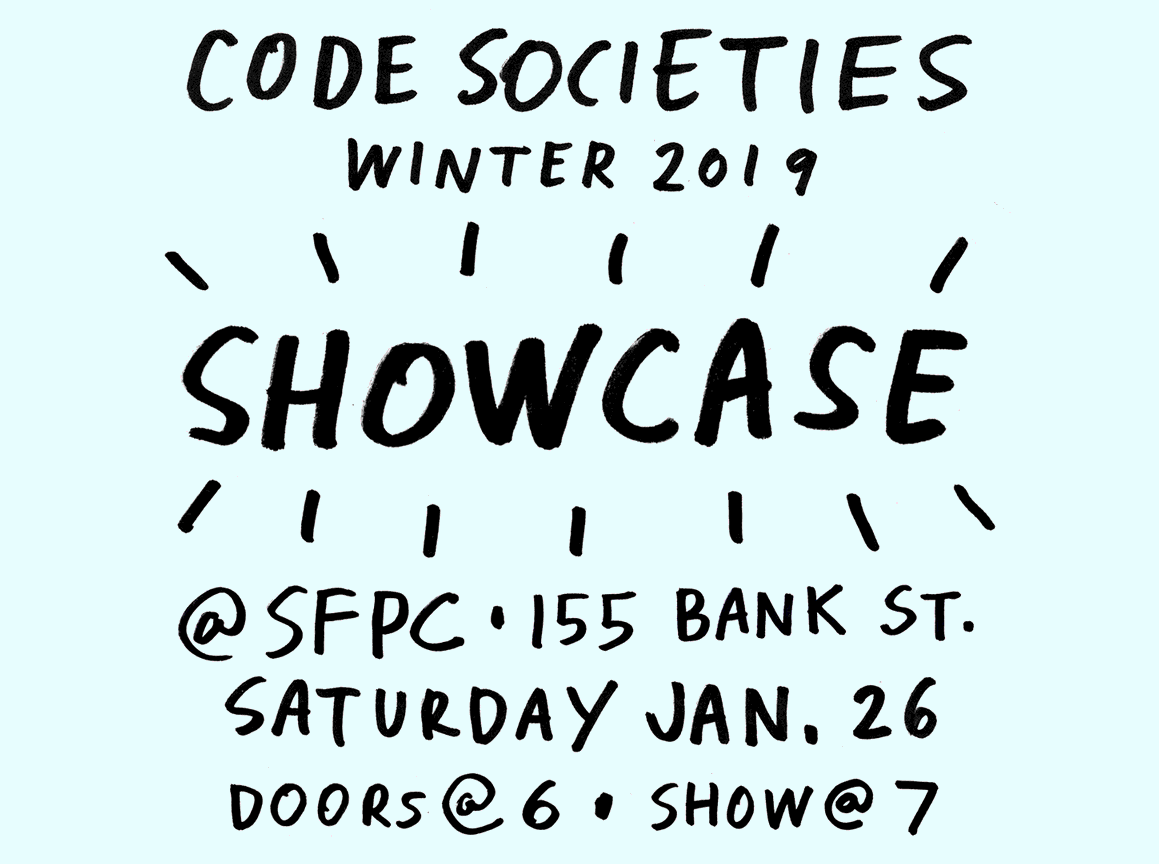Code Societies Winter 2019
Checkout our showcase livestream!
Code Societies: Student Showcase
written by emma rae norton & nicole cheng on 01 Feb 2019

Critical Simulation
written by Nicole Cheng on 30 Jan 2019
From the beginning of Code Societies Winter 2019, we had been warned to start Nora Khan’s extensive reading list early to be sufficiently prepared for our last class: Critical Simulation. To start off the class, Nora began with a lecture that delved deeper into the concepts mainly stemming from Fred Turner’s From Counterculture to Cyberculture. This was followed by presentations and discussion about two drawing assignments we were asked to complete prior to class that asked us to interrogate our understanding of the world of technology. Through a collaborative drawing exercise, we ended the class with collective imaginations of futures we wanted could look like.
Networked Terraforming Pt. 2
written by Nicole Cheng on 27 Jan 2019
Following the discussions we had last class surrounding terraforming, we were each tasked with selecting artifacts that we would want to “show someone living in a far-future terraformed outer planet in order to explain the patterns and conditions that produced the Earth that their ancestors chose to leave.” Gleaning everything from dandelions to the Salton Sea, we gave short presentations on our artifacts in class that culminated in printed in a newsletter we gave out at the concluding Code Societies Winter 2019 Showcase entitled Lessons for the Terraformed.
Cybernetics of Sex: Technology, Feminisms, & the Choreography of Culture
written by Nicole Cheng on 25 Jan 2019
Day 13: Software as Ideology with American Artist
written by emma rae norton on 24 Jan 2019
We will look in depth at Wendy Hui Kyong Chun’s theory of software as an analogy for ideology and how she traces early computational design to existing dynamics of gender, power and control. We will also read the essay Black Gooey Universe by American Artist which considers how the erasure of Blackness (both formally and racially) was significant to the development of early computer interfaces. We will look at examples of artists and artworks that operate within these modes of critique.
Networked Terraforming Pt. 1
written by Nicole Cheng on 23 Jan 2019
if you ever code something that “feels like a hack but it works,” just remember that a CPU is literally a rock that we tricked into thinking - Tweet from @daisyowl
we play programmed
written by Mimi Doan on 18 Jan 2019
we play programmed. is a class about performance, not just as an art but performance as behavior.
Ethicsware
written by Mimi Doan on 15 Jan 2019
What is technology that debates and disputes, rather than fulfills our desires? What is intimate software, created by us, only for us, that debates with our ethical selves?
The Computational Scrawl Session 2
by emma @doodybrains rae norton on 14 Jan 2019
This two-part workshop examines the physical gesture and material artifacts of the act of writing, as seen through the lens of computation and digital media. Taking contemporary and historical practices in asemic poetry, experimental typography and automatic writing as inspiration, participants will use the Python programming language to prototype speculative writing technologies that challenge conventional reading practices and notions of sense-making.
WYFY: Exorcizing Technology
written by Mimi Doan on 12 Jan 2019
Whose world is this? The World is Ours. Together students will work thru a Beta version of BUFUs latest experimental model on organizing WYFY - a project seeking to invite us to rethinking how we build space online// IRL for our most equitable future. We will also participate in various meditative exercises to exorcize technology.
Day 5: Distributed Web of Care with Taeyoon Choi
by Nicole Cheng on 11 Jan 2019
Taeyoon Choi is the computer lab instructor I wish I had. Maybe if my introduction to computers and the internet were not so simplistic and focused on hardware, maybe the way I navigate our digital world today would be drastically different.
Day 4: Building Nets for Floating Data
written by Mimi Doan on 10 Jan 2019
Building Nets for Floating Data is a one-session class on scraping information from websites, including text, images, and source code. We will talk about potential uses of large datasets, look at examples of artworks that use scraping as their informational backbone, and survey the ecosystem of online information gathering at large.
The Computational Scrawl
written by emma @doodybrains rae norton on 09 Jan 2019
This two-part workshop examines the physical gesture and material artifacts of the act of writing, as seen through the lens of computation and digital media. Taking contemporary and historical practices in asemic poetry, experimental typography and automatic writing as inspiration, participants will use the Python programming language to prototype speculative writing technologies that challenge conventional reading practices and notions of sense-making.
Computational Methods of Code Societies
✿ this guide was compiled by emma @doodybrains rae norton on 08 Jan 2019
🍃The computer, the programmer, the relationship they have with each other, and the environments they create🍃
Introduction to Code Societies
written by Mimi Doan on 07 Jan 2019
Code Societies Winter 2019 is the second iteration of SFPC’s Code Societies, a three week intensive organized by Melanie Hoff and TA’d by Ying Quan Tan and Nabil Hassein. The first session of the course began by getting to know one another - our names, our origins, our pronouns - a little bit about where we’re from before embarking towards what we hope to accomplish, both collectively and individually, during our time at SFPC. During our introductory session, Melanie challenged us to push the bounds of what we considered code, how code might be used to make sense of ourselves and the spaces that we inhabit, and vice versa. “We can use code to talk about poetics, but we can also use poetics and our bodies and our relationships and much more to talk about code.” Code Societies is both a theme and a prompt - how can we challenge the social and computational codes that already exist and the ways that we understand ourselves in relation to them? Can we challenge ourselves to invent new ones?
